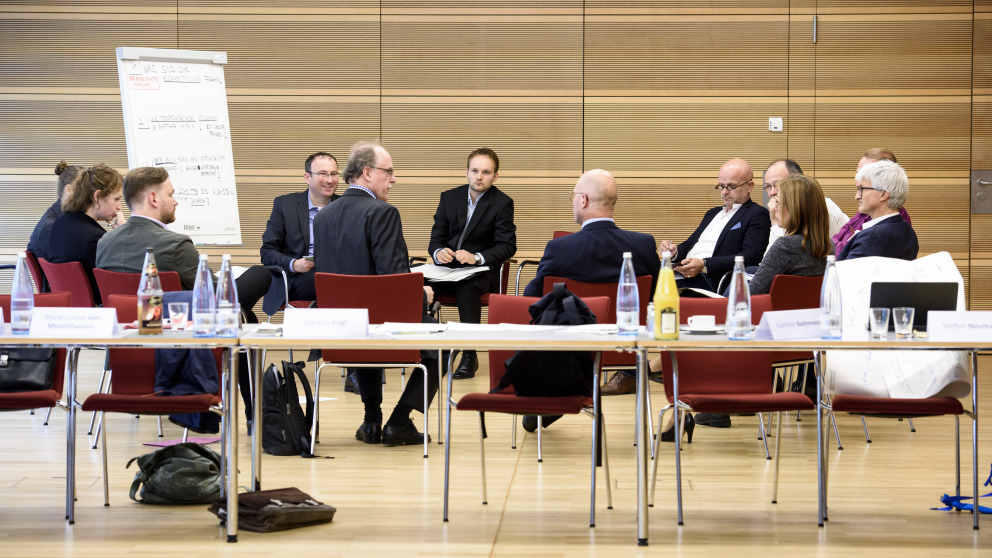Science Platform Sustainability 2030 Calls for Systematic Implementation of the German Sustainable Development Strategy
18.12.2017
In its inaugural publication, the Science Platform Sustainability 2030 has called for a significant increase in efforts to implement the United Nations 2030 Agenda for Sustainable Development in Germany. To this end, a steering group of representatives from science, business and civil society, which was established at the invitation of the Federal Government, has outlined the platform's positions and tasks vis-à-vis politics and science. The platform, as a space for dialogue and a source of innovative ideas, seeks to generate added value for science as well as for political and societal practice and to make a significant contribution to the implementation of the sustainable development goals. Key elements of its initial programme of work include the establishment of working groups to address the topics of sustainable consumption, the future of work and global commons.

In the new edition of its Sustainable Development Strategy, the German government has defined its approach to implementing the 2030 Agenda. Now, the platform's steering committee, led by Patrizia Nanz (IASS), Dirk Messner (SDSN Germany) and Martin Visbeck (DKN Future Earth), has highlighted the importance of the 2030 Agenda as a pact to secure a sustainable future for the global community. The 2030 Agenda provides a guiding strategy and set of goals that are also applicable in Germany and for all its various stakeholders, including science. The agenda provides a framework for action towards sustainable development and assigns responsibility to specific actors.
Efforts to date have been inadequate
According to the Scientific Platform, previous efforts to shift society towards more sustainable development pathways have proved inadequate. The adoption of a "business-as-usual" approach across society, the economy, and policymaking would be both inadmissible and lacking in foresight. The energy transition, the decarbonisation of the economy, and the transformation of our agricultural, food production and mobility systems have all been identified as key challenges by the public. Policymakers and other societal actors have a responsibility to take active steps to foster these transformations.
In the view of the platform's steering committee, science serves as a central source of societal self-reflection and fulfils the important role of mobilising diverse forms of knowledge and science in all its forms (from basic to applied research, and from transformation to transformative research) and providing orientational knowledge to guide sustainable development. The mission and broader goal of the Science Platform Sustainability 2030 is to reflect on sustainability policy and provide new impetus for innovation in policymaking and society as well as for science and research. In doing so, the platform will tap into the potentials offered by Germany's pluralistic system of research and scientific funding to enhance its work.
Analysing deficits, strengthening future prospects
The Science Platform Sustainability 2030 will tackle challenges in which Germany has significant deficits. These include, for example, child poverty in Germany as well as the various problems arising in connection with unsustainable patterns of consumption and production. In addition, the platform will address topics that are ripe for political and societal debate, but which are yet to be discussed with the appropriate degree of urgency and depth. Examples of such issues include the current debates around mobility and the future of employment, in particular in relation to digitisation. The platform will also address key transformation processes that require ongoing scientific input to accelerate or adjust their unfolding, such as decarbonisation strategies or prosperity and growth models. And not least of all, the platform will address cross-sectoral issues that are reflective of the integrative character of the 2030 Agenda and which would therefore benefit from interdisciplinary scientific analyses. One such issue is the role natural resources and public goods in achieving the targets of multiple Sustainable Development Goals (SDGs).
Science Platform fosters transdisciplinary dialogues
The platform's efforts to stimulate, organise, and moderate dialogue between science and stakeholders from policymaking, business, and civil society will be central to its success. To this end, the platform's steering group has established a number of temporary working groups in line with its thematic priorities: sustainable consumption, the future of work, and global commons.
More information on these working groups, including their composition and opportunities for participation, will be available shortly. In addition to the outputs of these working groups, the Science Platform will comment on the further development of the German Sustainability Strategy, submit statements to the State Secretary Committee for Sustainable Development and present and discuss its findings at various events with different dialogue formats.
Supported by the international research networks SDSN Germany and DKN Future Earth, together with the IASS, the Science Platform Sustainability 2030 was founded on 8 May 2017 and presented to the public at the 13th BMBF Forum for Sustainability (FONA) on 9 May 2017. This platform operates independently and receives input from a circle of federal ministries that currently includes the ministries of Education and Research (BMBF), Environment, Nature Conservation, Building and Nuclear Safety (BMUB), Economic Cooperation and Development (BMZ), Food and Agriculture (BMEL) and Labour and Social Affairs (BMAS) and the Federal Chancellery. The secretariat of the Science Platform Sustainability 2030 is hosted by the IASS in Potsdam.